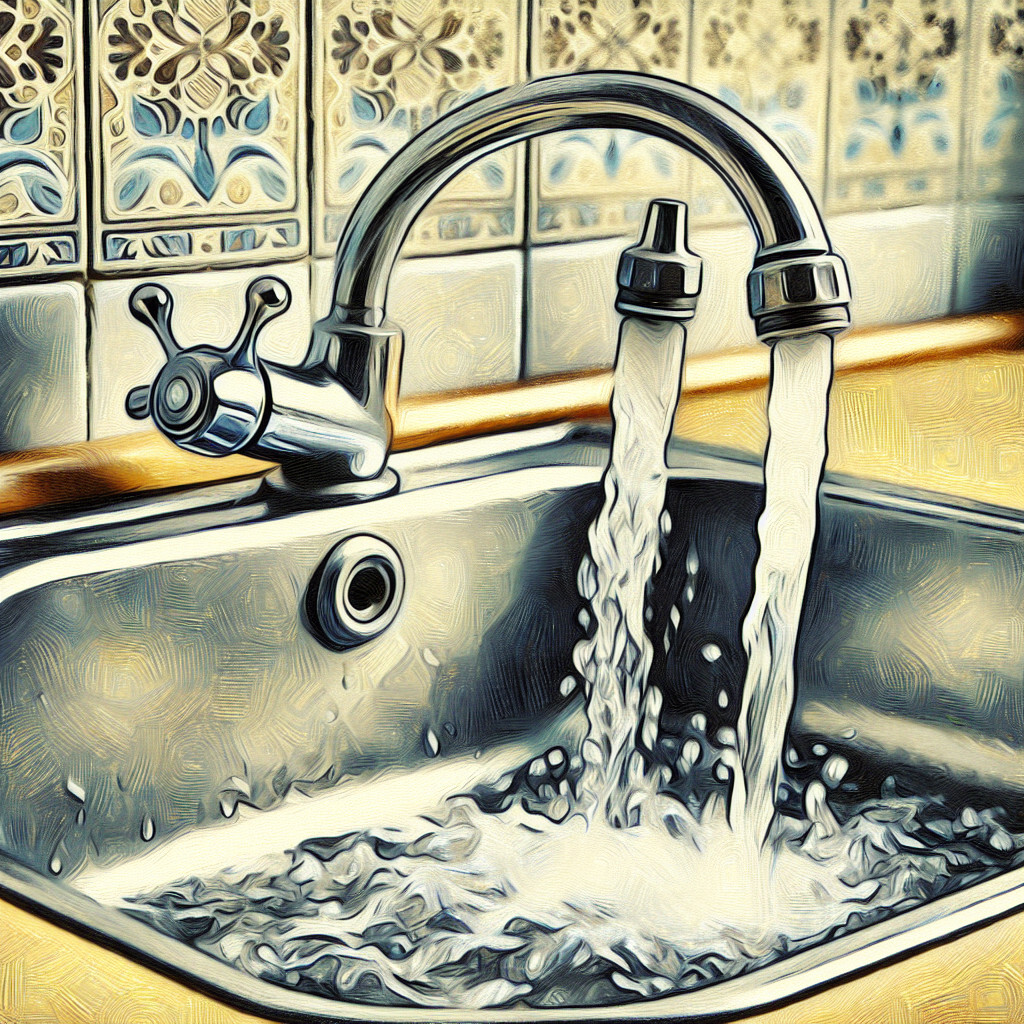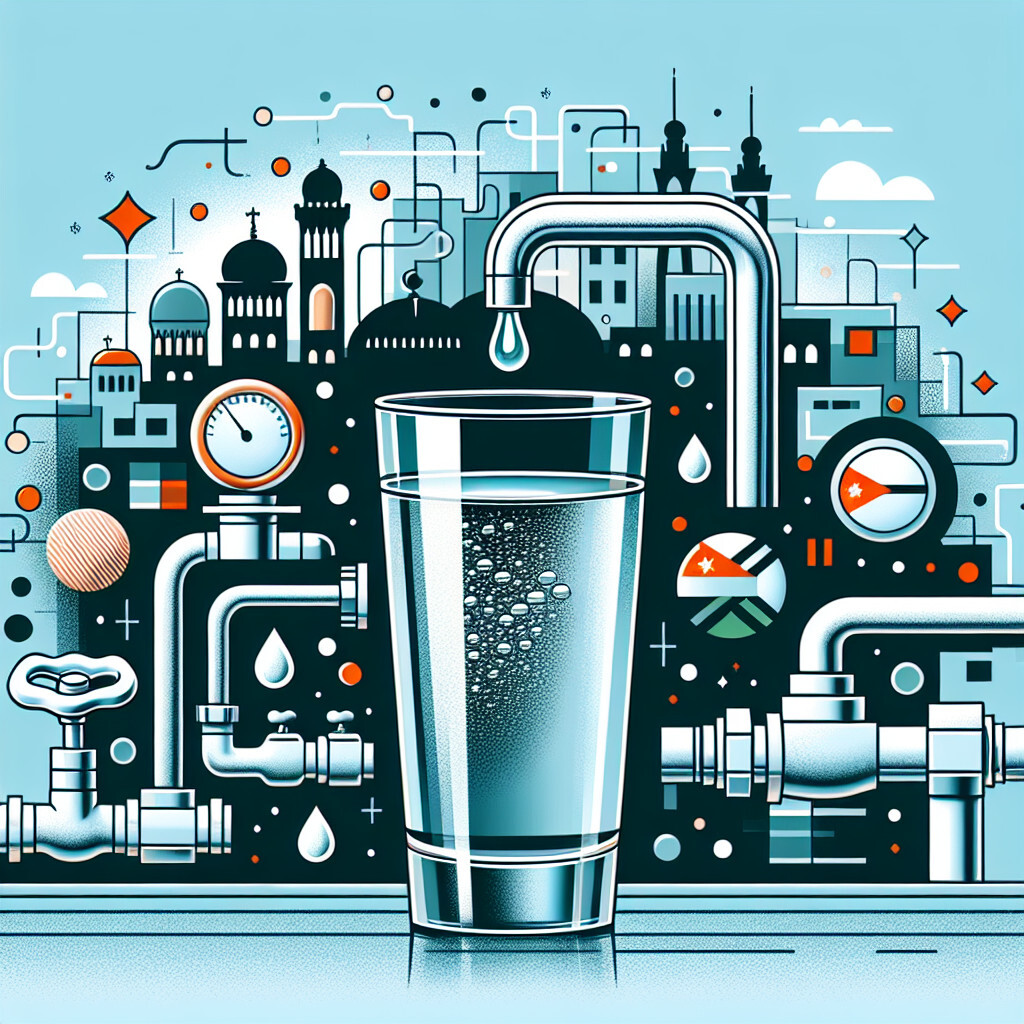-
Table of Contents
“Jordan’s Tap Water: A Precious Commodity in a Desert Land.”
Introduction

The tap water in Jordan is generally considered safe for drinking and cooking purposes, as it meets World Health Organization standards. However, due to the country’s arid climate and limited water resources, the supply can be inconsistent. The water undergoes treatment processes to remove impurities, but the taste and quality can vary across different regions. Some locals and tourists prefer to drink bottled water or use water filters for a better taste. Despite the efforts to manage and conserve water, Jordan remains one of the world’s most water-scarce countries.
Understanding the Quality of Tap Water in Jordan
In the arid landscapes of the Middle East, water is a precious resource. Jordan, a country known for its ancient ruins and desert landscapes, is no exception. The quality of tap water in Jordan is a topic of interest for both locals and tourists alike. This article aims to provide an understanding of the quality of tap water in Jordan, shedding light on its safety, taste, and overall suitability for consumption.
Jordan is one of the most water-scarce countries in the world. The country’s water resources are under immense pressure due to population growth, urbanization, and climate change. Despite these challenges, the government of Jordan has made significant strides in ensuring the provision of safe and clean water to its citizens. The tap water in Jordan is generally safe to drink, as it meets the World Health Organization’s (WHO) standards for drinking water quality. The water is treated and purified in modern treatment plants before it is distributed to households.
However, the safety of tap water can sometimes be compromised due to the country’s aging water infrastructure. The water pipes in some areas are old and corroded, which can lead to contamination. Therefore, while the water leaving the treatment plants is safe, the quality can deteriorate by the time it reaches the tap. This is particularly true in some of the older parts of Amman, the capital city, and in rural areas where the infrastructure is less developed.
In terms of taste, many locals and tourists find the tap water in Jordan to be palatable. However, it is worth noting that the taste of water can vary depending on the source and the treatment process. In Jordan, the water is often hard due to the high mineral content, which can give it a distinct taste. Some people may find this taste unpleasant and opt for bottled water instead.
Despite the general safety of tap water in Jordan, many locals prefer to drink bottled water or use water filters at home. This is largely due to concerns about the potential contamination of tap water during distribution. Bottled water is widely available in Jordan and is relatively inexpensive. However, it is important to note that the environmental impact of bottled water is significant, due to the plastic waste it generates.
For tourists visiting Jordan, it is generally recommended to drink bottled water, especially if they are not accustomed to the local water. This is to avoid any potential health issues that could arise from drinking water that one’s system is not used to. However, tap water in Jordan is generally safe for activities such as brushing teeth and washing fruits and vegetables.
In conclusion, the tap water in Jordan is generally safe to drink, meeting international standards for water quality. However, due to potential contamination during distribution and the distinct taste of the water, many locals and tourists opt for bottled water. As Jordan continues to grapple with water scarcity, efforts to improve the country’s water infrastructure and ensure the safety and quality of tap water are of paramount importance.
The Impact of Jordan’s Geography on Its Tap Water Supply
Jordan, a country located in the heart of the Middle East, is characterized by its arid and semi-arid climate, which significantly impacts the availability and quality of its tap water supply. The country’s geographical location and topography, coupled with its climatic conditions, play a pivotal role in shaping the water scarcity issues that Jordan currently faces.
The Kingdom of Jordan is predominantly a desert region, with over 90% of its land area falling under this category. This geographical feature, coupled with the country’s low annual rainfall of less than 200mm, contributes to the scarcity of surface water resources. The scarcity is further exacerbated by the high evaporation rates due to the country’s hot and dry climate. Consequently, Jordan relies heavily on underground water resources, which account for approximately 54% of the total water supply.
However, the over-extraction of these underground water resources has led to a significant decline in their levels, resulting in the intrusion of saline water in some areas. This has had a detrimental impact on the quality of tap water, making it unsuitable for drinking without proper treatment. Furthermore, the country’s topography, characterized by highlands and deep valleys, makes the transportation and distribution of water a challenging task. This often results in an unequal distribution of water resources, with some areas receiving an abundant supply, while others face severe shortages.
The country’s geographical location also plays a significant role in its water scarcity issues. Jordan shares its major surface water resources, namely the Jordan River and the Yarmouk River, with neighboring countries. The over-extraction of these shared water resources by these countries has led to a significant reduction in the amount of water reaching Jordan. This has further strained the country’s already limited water resources.
In addition to these natural factors, human activities have also contributed to the degradation of Jordan’s tap water quality. Rapid urbanization and population growth have led to an increase in water demand, putting additional pressure on the country’s limited water resources. Moreover, inadequate wastewater treatment and disposal have resulted in the contamination of both surface and underground water resources, further degrading the quality of tap water.
In response to these challenges, the Jordanian government has implemented several measures to improve the quality and availability of tap water. These include the construction of dams and reservoirs to store rainwater, the implementation of water-saving technologies, and the promotion of water conservation practices among the population. Moreover, the government has also invested in desalination projects and wastewater treatment plants to increase the supply of potable water.
In conclusion, Jordan’s geographical location, climate, and topography significantly impact the availability and quality of its tap water supply. The country’s arid and semi-arid climate, coupled with its predominantly desert topography, contribute to the scarcity of surface water resources. Moreover, the over-extraction of underground water resources and shared surface water resources has led to a decline in their levels and quality. However, through the implementation of various measures, the Jordanian government is striving to improve the quality and availability of tap water in the country.
Challenges and Solutions: The State of Tap Water in Jordan
In the heart of the Middle East, the Hashemite Kingdom of Jordan is a country known for its rich history, cultural heritage, and warm hospitality. However, beneath the surface of this vibrant nation lies a pressing issue that has been a cause for concern for many years – the state of tap water. Jordan, being one of the most water-scarce countries in the world, faces significant challenges in providing clean, safe, and reliable tap water to its citizens.
The primary challenge lies in the scarcity of water resources. Jordan’s geographical location, coupled with the effects of climate change, has resulted in a severe shortage of freshwater sources. The country’s main water supply comes from the Jordan River and the Disi aquifer, both of which are under immense strain due to over-extraction and pollution. This has led to a situation where the demand for water far exceeds the supply, leading to frequent water rationing and a heavy reliance on expensive water tankers.
The quality of tap water is another significant issue. While the water supplied by the government is generally safe to drink, the quality can vary greatly depending on the location. In urban areas, the water is often treated and chlorinated, making it safe for consumption. However, in rural and remote areas, the water can sometimes be contaminated with bacteria, heavy metals, and other harmful substances due to inadequate treatment and old, corroded pipes. This has led to a widespread perception that tap water in Jordan is unsafe to drink, causing many people to resort to bottled water or water purification systems.
Despite these challenges, the Jordanian government, in collaboration with international organizations, has been making concerted efforts to improve the state of tap water in the country. One of the key strategies has been the implementation of water management projects aimed at increasing water efficiency and reducing water loss. This includes the rehabilitation of old water networks, the installation of water-saving devices, and the promotion of water conservation practices among the public.
In addition, there has been a significant push towards the use of renewable energy for water treatment and desalination. For instance, the Red Sea-Dead Sea Water Conveyance Project, a joint venture between Jordan, Israel, and the Palestinian Authority, aims to desalinate seawater from the Red Sea using solar power and convey the treated water to areas in need. This project, once completed, is expected to significantly boost Jordan’s water supply and improve the quality of tap water.
Furthermore, the government has been investing in public awareness campaigns to educate the public about the safety of tap water and the importance of water conservation. These campaigns have been instrumental in changing public perceptions and encouraging more people to drink tap water, thereby reducing the reliance on bottled water and contributing to environmental sustainability.
In conclusion, while the state of tap water in Jordan presents significant challenges, there are also promising solutions on the horizon. Through a combination of improved water management, technological innovation, and public education, Jordan is making strides towards ensuring that every citizen has access to clean, safe, and reliable tap water. It is a complex and ongoing journey, but one that is crucial for the health and well-being of the Jordanian people and the sustainable future of the country.
Health Implications of Consuming Tap Water in Jordan
In the arid nation of Jordan, the question of water quality is of paramount importance. As one of the most water-scarce countries in the world, Jordan faces significant challenges in providing its citizens with clean, safe drinking water. This article will explore the health implications of consuming tap water in Jordan, providing an informative and formal analysis of the current situation.
Jordan’s water scarcity is primarily due to its geographical location, characterized by low rainfall and high evaporation rates. This scarcity is further exacerbated by population growth, urbanization, and the influx of refugees, particularly from Syria. The country’s water infrastructure is under immense pressure, and this has significant implications for the quality of tap water.
The quality of tap water in Jordan varies significantly across the country. In urban areas, tap water is generally safe to drink, although it may not always meet international standards for taste and odor. The water is treated and chlorinated to kill bacteria and other pathogens, reducing the risk of waterborne diseases. However, the chlorine used in the treatment process can react with organic matter in the water, forming potentially harmful byproducts. While these byproducts are typically present at levels below the safety thresholds set by the World Health Organization, long-term exposure may still pose health risks.
In rural areas and refugee camps, the situation is often more precarious. Here, tap water is frequently contaminated with bacteria, viruses, and parasites due to inadequate sanitation and treatment facilities. Consuming this water can lead to a range of health problems, from diarrhea and stomach cramps to more serious conditions like typhoid and hepatitis A. Moreover, the water in these areas often contains high levels of nitrates, which can be harmful, especially to infants and pregnant women.
The presence of heavy metals in Jordan’s tap water is another significant concern. Studies have found elevated levels of lead, copper, and other heavy metals in various parts of the country. These metals can leach into the water supply from natural sources, as well as from aging pipes and plumbing fixtures. Consuming water with high levels of heavy metals can lead to a range of health problems, including kidney damage and developmental issues in children.
The Jordanian government is well aware of these issues and has implemented various measures to improve the quality of tap water. These include upgrading treatment facilities, replacing old pipes, and promoting water conservation. However, these efforts are often hampered by financial constraints and the ongoing political instability in the region.
In conclusion, while tap water in Jordan’s urban areas is generally safe to drink, there are significant health risks associated with consuming tap water in rural areas and refugee camps. The presence of harmful bacteria, parasites, nitrates, and heavy metals in the water can lead to a range of health problems. Therefore, it is advisable for individuals in these areas to boil their water before consumption or use bottled water whenever possible. As for the urban dwellers, while the tap water is treated, it is still recommended to use water filters to reduce the risk of exposure to chlorine byproducts and heavy metals.
Q&A
1. Question: Is tap water in Jordan safe to drink?
Answer: No, tap water in Jordan is generally not considered safe to drink. It’s recommended to drink bottled water.
2. Question: Why isn’t tap water in Jordan safe to drink?
Answer: The tap water in Jordan may contain contaminants and high mineral content that can cause health issues.
3. Question: How do locals in Jordan get their drinking water?
Answer: Most locals in Jordan rely on bottled water or water delivered in large tanks for their drinking needs.
4. Question: Are there efforts to improve the tap water quality in Jordan?
Answer: Yes, the Jordanian government and international organizations are working on projects to improve water infrastructure and quality, but progress is slow due to resource limitations and other challenges.
Conclusion
The tap water in Jordan is generally considered safe to drink. However, due to issues such as water scarcity, pollution, and outdated infrastructure, the taste and quality can vary across the country. Many locals and tourists prefer to drink bottled water or use water filters for consumption.






